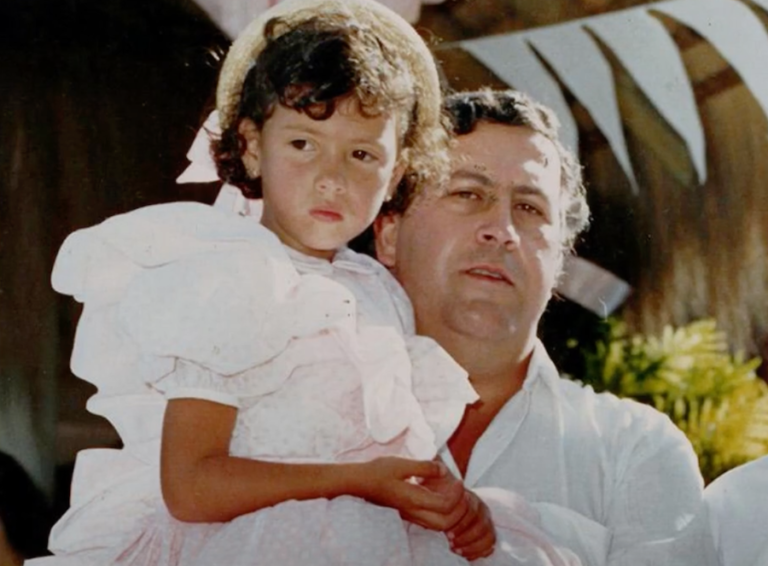Manuela Escobar, the daughter of notorious Colombian drug lord Pablo Escobar, has led a life that stands in stark contrast to the fame and infamy surrounding her father. While Pablo Escobar’s empire of wealth and violence placed him at the center of one of the world’s largest criminal organizations, his daughter Manuela has sought a quiet, private life, far from the spotlight. Growing up as the child of one of history’s most infamous figures profoundly impacted her life, leading to a journey shaped by exile, fear, and an enduring pursuit of anonymity.
In this article, we explore the lesser-known story of Manuela Escobar, her early life in Colombia, the struggles and challenges she faced, and how she has forged a life separate from her father’s shadow.
1. Early Life: Growing Up as Pablo Escobar’s Daughter
Manuela Escobar was born in 1984 in Colombia during the height of her father’s power. As the youngest child of Pablo Escobar and Maria Victoria Henao, Manuela was adored by her father, who is said to have been fiercely protective and indulgent toward her. Pablo Escobar, despite his violent reputation, was known to spoil Manuela, fulfilling her wishes in extravagant ways.
One famous story that highlights her father’s devotion happened when the family was hiding in the mountains to evade capture. Manuela fell ill, and Escobar, desperate to keep her warm, reportedly burned millions of dollars in cash to light a fire. Such acts contributed to the legend surrounding Pablo Escobar’s relationship with his family and his willingness to do anything to keep them safe, even if it came at a high price.
2. A Life in Hiding and the Aftermath of Pablo Escobar’s Death
In 1993, when Pablo Escobar was killed in a police raid, Manuela was only nine years old. The fall of her father’s empire left the family vulnerable, and they were forced to flee Colombia to avoid the wrath of rival cartels and government authorities. Manuela, her brother Juan Pablo (now known as Sebastian Marroquin), and their mother Maria Victoria went into exile, living under assumed names in various countries. Their journey took them through several Latin American countries and eventually led them to Argentina, where they finally settled.
While her brother and mother began to adjust to their new life and identities, Manuela struggled to overcome the psychological toll of her father’s legacy. Growing up constantly on the run and under assumed names, she faced intense scrutiny and threats, which deeply impacted her mental health.
3. Life in Argentina: A New Identity and a Quest for Privacy
In Argentina, Manuela Escobar assumed a new name and identity to distance herself from her father’s notorious past. She, her mother, and brother tried to live as ordinary citizens. While her brother eventually began to speak openly about their father’s legacy, even writing a book and giving interviews, Manuela took a different approach, choosing complete privacy and avoiding the public eye.
Over the years, Manuela has remained largely silent about her father, refusing interviews and shying away from any media attention. Her mother and brother have occasionally shared updates about her life, emphasizing that she desires to live without the Escobar name overshadowing her. She has reportedly battled depression and anxiety, conditions that have persisted throughout her life.
4. Manuela’s Relationship with Her Family
Manuela’s brother, Sebastian Marroquin, has become a public figure, writing books, giving talks, and even producing a documentary about their father titled Sins of My Father. While he has reconciled with their family history to an extent, Manuela has chosen not to engage in public discussions about her father’s legacy.
Despite their different approaches to dealing with the past, Manuela and her brother remain close. Her family is protective of her, respecting her wish for privacy and guarding her from public scrutiny. This bond has been essential for Manuela, providing her with stability and support in a world that still associates her with the Escobar name.
5. The Psychological Toll of a Notorious Legacy
The impact of growing up as Pablo Escobar’s daughter has left a deep mark on Manuela’s mental health. From a young age, she experienced trauma, witnessing her family’s fear of capture, the threat of assassination, and the loss of her father. Living in exile, under constant threat, and in fear of her safety left scars that would follow her throughout her life.
Psychologists often highlight that children of notorious public figures, especially those involved in crime, face unique challenges. These individuals may experience an intense form of survivor’s guilt, shame, and isolation, often struggling with their identity in relation to their parents’ legacy. For Manuela, this has meant managing psychological burdens quietly and privately, with her family’s support.
6. Life Away from the Spotlight: A Quiet Legacy
Unlike her father’s public and violent legacy, Manuela Escobar has crafted a quiet, largely anonymous life. Her choice to remain silent speaks to her desire to distance herself from the notoriety that surrounds her father’s name. Her decision not to be a public figure and her choice to live with a new identity in Argentina reflect her commitment to building a life free from the shadow of her father’s crimes.
Her path contrasts sharply with that of her brother, who has taken up the cause of sharing their family’s story as a way to promote peace and reconciliation. In his public appearances, he has made it clear that Manuela wishes to live a private life, one that honors her own journey and experiences without reliving her father’s past.
Conclusion: Manuela Escobar’s Story of Resilience and Privacy
Manuela Escobar’s life is a testament to resilience in the face of an unimaginable legacy. While Pablo Escobar’s name is etched in history, Manuela has made a deliberate choice to step away from the past and protect her privacy. Her story is one of survival, resilience, and a steadfast commitment to moving forward without allowing her father’s legacy to define her.
